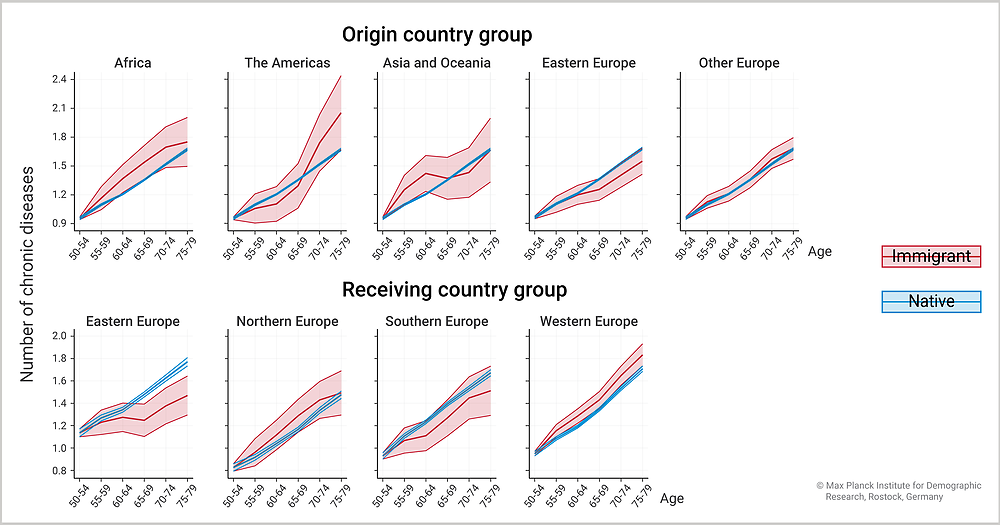August 14, 2023 | News | New Publication
Healthy Immigrants, Unhealthy Ageing: Health Development of Immigrants and Natives
Every year, millions of people decide to leave their homes and move to another country. The reasons are many and varied. People flee war and climate change, or follow a job to another country. But what happens to their health when they leave home and grow old in another country? Su Yeon Jang, a researcher at the Max Planck Institute for Demographic Research (MPIDR), together with Anna Oksuzyan, Mikko Myrskylä, Frank van Lenthe (Erasmus MC University Medical Center) and Silvia Loi, explores this question in their latest paper.

Moving far from home to another country affects health: MPIDR researchers studied the health trajectories of migrants in Europe compared to their native counterparts. © iStockphoto.com/PCH-Vector
In a recent study, Su Yeon Jang and her colleagues examined the differences in age-related health decline between immigrants and natives of a country. The comparison focused on the number of chronic diseases. Data from adults aged 50-79 years from 28 European countries were analyzed. They were taken from the SHARE - Survey of Health, Ageing and Retirement in Europe panel. The development of chronic diseases with increasing age was examined as a function of the migrants' region of origin and the country of destination in comparison with natives of the same age.
Poorer health among immigrants
"People who are new to a country tend to be healthier than the locals. Healthier individuals are more likely to embark on such an adventure, but the longer migrants stay in a country, the worse their health becomes. What we question here is the contribution of aging to these health changes," Jang explains. The health burden of migrants is generally higher than that of natives, regardless of gender, country of origin or destination.
Health deterioration of migrants slows down in older ages
"However, we found that migrants aged 65 and older develop chronic diseases at a slower rate than their native-born counterparts," says Jang. "It is already known that when immigrants move to countries where smoking or drinking is common, they may adopt these unhealthy behaviors. But at the same time, there are studies pointing out that they are more likely to return to healthy behaviors, such as quitting smoking, drinking less alcohol and exercising more, than natives of the same age," she says. This could be one reason why the development of chronic diseases slows down.

Chronic health trends differentiated by country of origin and country of immigration. © MPIDR
Little difference in migration to near abroad and similar cultural groups
In addition, migrants have different experiences depending on where they come from or where they settle. For example, when people migrate to a nearby or neighboring country that is very similar to their own culture and language, there is less stress from adjusting to the receiving society. "This may explain what we found in our study, especially in the Eastern European region, where migration to neighboring countries is common. With less stress, the health of migrants doesn't approach that of natives, as is already known. In Eastern Europe, we observe that migrants’ health deteriorates at a slower rate than that of natives," says Jang.
Far from home, health declines fastest
The paper is part of Su Yeon Jang's dissertation. She will continue to explore the topic in further studies: "There are differences within migrant groups. People who come to Europe from Asia or the Americas get chronic diseases faster and more often than migrants as a whole. This suggests that origin may influence health. The further away from home and the greater the social differences between the country of origin and the country of destination, the higher the risk of chronic disease," Jang concludes.
Original Publication
Jang, Su Yeon;Oksuzyan, Anna; Myrskylä, Mikko; van Lenthe, Frank J.; Loi, Silvia: Healthy Immigrant, Unhealthy Ageing? Analysis of Health Decline among Older Migrant and Natives Across European Countries in SSM - Population Health. DOI: https://doi.org/10.1016/j.ssmph.2023.101478
Authors and Affiliations
Su Yeon Jang, Max Planck Institute for Demographic Research, Rostock, Germany; Erasmus MC University Medical Center, Rotterdam, Netherlands
Anna Oksuzyan, Max Planck Institute for Demographic Research, Rostock, Germany; Bielefeld University, Bielefeld, Germany
Mikko Myrskylä, Max Planck Institute for Demographic Research, Rostock, Germany; University of Helsinki, Helsinki, Finland; Max Planck – University of Helsinki Center for Social Inequalities in Population Health, Rostock, Germany and Finland, Helsinki
Frank J. van Lenthe, Erasmus MC University Medical Center, Rotterdam, Netherlands
Silvia Loi, Max Planck Institute for Demographic Research, Rostock, Germany; Max Planck – University of Helsinki Center for Social Inequalities in Population Health, Rostock, Germany and Finland, Helsinki
Keywords
Migrants; Chronic conditions; Longitudinal; Fixed-effects models; Europe